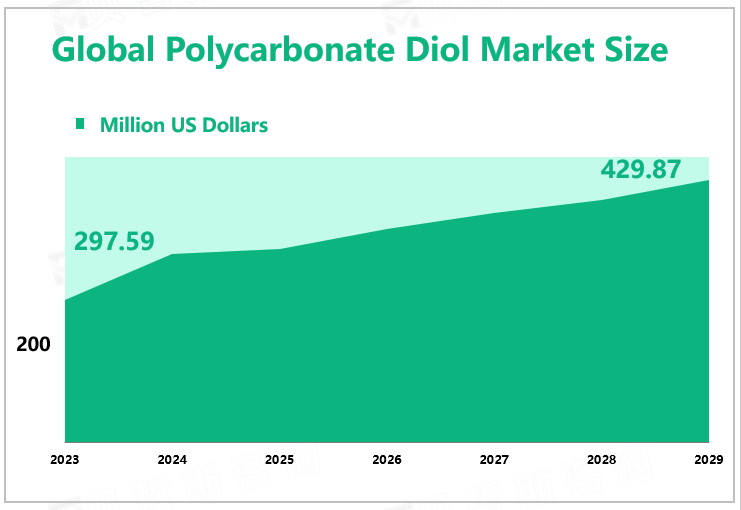Global Polycarbonate Diol Market Overview
According to Global Market Monitor, the global polycarbonate diol market size was $297.59 million in 2023 and is expected to grow to $429.87 million by 2029.
Polycarbonate diols are premium polyester polyols. Compared to standard polyester polyols, polycarbonate diols provide significantly enhanced hydrolytic stability, impact resistance, hardness, and chemical resistance. Polycarbonate diols are commonly used in the synthesis of polyurethane resins, acrylic resins, and polyester resins.
Increasing Demand
The growth of the synthetic leather industry has been influenced by the availability of raw materials, increasing environmental concerns, protection of animals, and changing consumer demands. As a result, the world has witnessed a major shift in the market from natural leather to synthetic leather. PU synthetic leather has excellent physicochemical properties and more closely resembles natural leather in terms of treatment, texture, and appearance. Due to the performance benefits of synthetic leather, it has replaced natural leather not only in furniture, clothing, luggage, bags, and shoes but also in car seat interiors and upholstery. The demand for high-quality, functional polyurethanes from global synthetic leather manufacturers continues to grow as the production of synthetic leather products increases and the industry structure upgrades.

Increased Environmental Awareness
Polycarbonate diols have been widely used to produce a wide range of polyurethane materials with excellent quality and performance. In addition, with increased global environmental awareness and stringent regulations, the industry's preference for polyurethane materials has shifted from solvent-based to water-based. To alleviate this problem, polycarbonate can be used instead of traditional polyols to improve the hydrolysis resistance of polyurethane materials. Therefore, polycarbonate diols can be widely used in the production of water-based polyurethane materials.
Regulations in the plastic industry have a significant impact, driving industry players to invest in advanced technologies and quality assurance measures. Compliance with regulatory frameworks ensures patient safety, fosters innovation, and establishes trust among customers.Polycarbonate diol technologies can be more expensive to develop, manufacture, and implement than conventional plastic technologies, especially for smaller manufacturers with limited resources. This can create potential growth for conventional substitutes for the market, mainly in underdeveloped economies.
Market News
In December 2023, the Mitsubishi Chemical Group announced the selection of their plant-derived polycarbonate diol, named BENEBiOL, for the interior finish coating at the Lawson Obihiro Nishi 21-Jo Minami 4-chome Store in Obihiro City, Hokkaido, Japan
In August 2022, UBE Fine Chemicals (Asia) Co., Ltd., one of its local subsidiaries in Thailand began to operate. The expansion was announced in response to growing demand in the Asian region. The production capacity of the facility is expected to grow from 8,000 metric tons per year to 12,000 metric tons per year.
|
Drivers |
The development of the global electronic information industry |
|
Demand for products from downstream industries |
|
|
Products are used in more fields |
|
|
Development in emerging countries |
|
|
Limitations |
High technical requirements |
|
There are some harmful ingredients in the product |
We provide more professional and intelligent market reports to complement your business decisions.